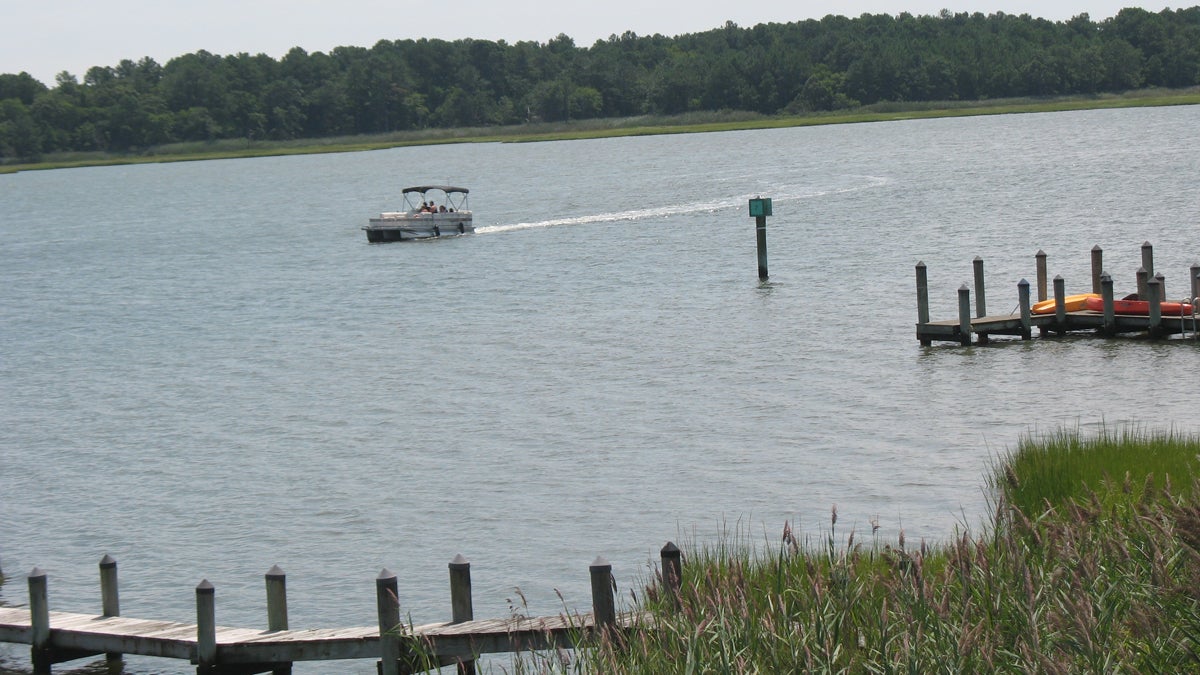Delaware gets $19 million for water research
The National Science Foundation awarded Delaware $19 million over the next five years to fund research into improving water quality and reducing the impact of rising seas.
Listen 0:52
A boat passes Beach Cove in Delaware's Inland Bays near Bethany Beach. (John Mussoni/WHYY)
As the country’s lowest-lying state, Delaware is especially vulnerable to rising sea levels — and the influence of saltwater on the wildlife that depends on freshwater wetlands. What’s more, water quality throughout the state is poor.
More than 90 percent of Delaware’s waterways are polluted, according to a Department of Natural Resources and Environmental Control study cited by the University of Delaware’s Kent Messer.
Now, Messer is leading a massive research project seeking a solution to the state’s water woes — with the help of the National Science Foundation, that has awarded the effort $19 million over the next five years to fund the work.
And, since every good government program needs a creative acronym, this effort has been dubbed Project WICCED, which stands for Water in the Changing Coastal Environment of Delaware. A cooperative endeavor of the University of Delaware, Delaware State, Delaware Tech and Wesley College, Project WICCED will assess threats to the state’s water quality and develop technical and public policy solutions to those threats.
“Sometimes, people call these types of problems wicked problems because we know it’s important, but we can’t solve it with quick simple technological fixes,” Messer said. “That’s why we called our project Project WICCED, to remind us of the importance of the challenges that water provides.”
The federal grant comes through the state’s Established Program to Stimulate Competitive Research. Delaware’s EPSCoR program began in 2003 as part of an effort to provide federal research money to states that typically didn’t get that funding.
Gov. John Carney said the money will help build research capacity in the state.
“It encourages and insists on collaboration … It’s intended to build on that expertise and that research capacity,” he said. That added capacity will help prepare Delaware’s students for the jobs of tomorrow.
“It’s not just about this wonderful project, which has incredibly important applications for one of the biggest challenges we face in our state,” he said.
The state will also spend $3.8 million to support Project WICCED.
The funding is good news for the universities taking part. The University of Delaware, for instance, will add six faculty members in areas including environmental toxicology, soil and water remediation and environmental modeling.
For a smaller school such as Dover’s Wesley College, the EPSCoR funding is life.
“It provides opportunities that we would not be able to offer our students who then become the leaders” and residents in the community, said Wesley President Robert Clark. “This type of research and forward thinking is essential.”
WHYY is your source for fact-based, in-depth journalism and information. As a nonprofit organization, we rely on financial support from readers like you. Please give today.




